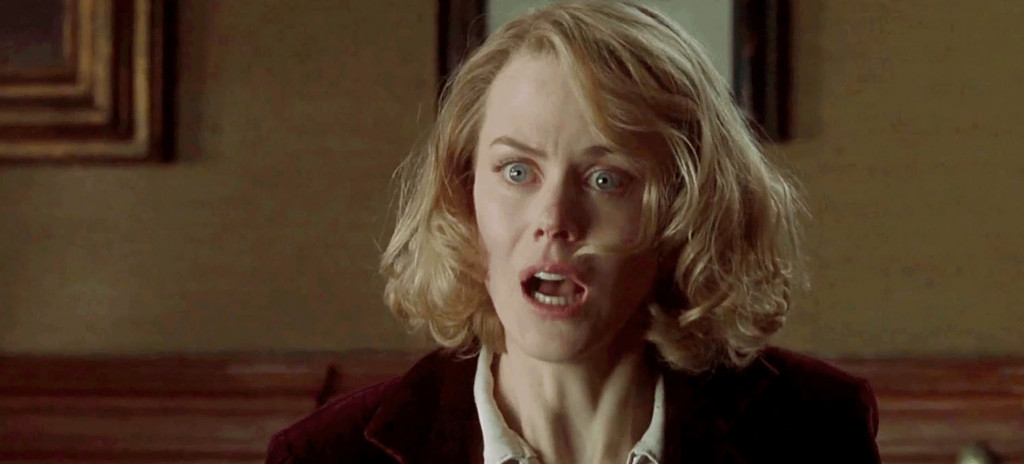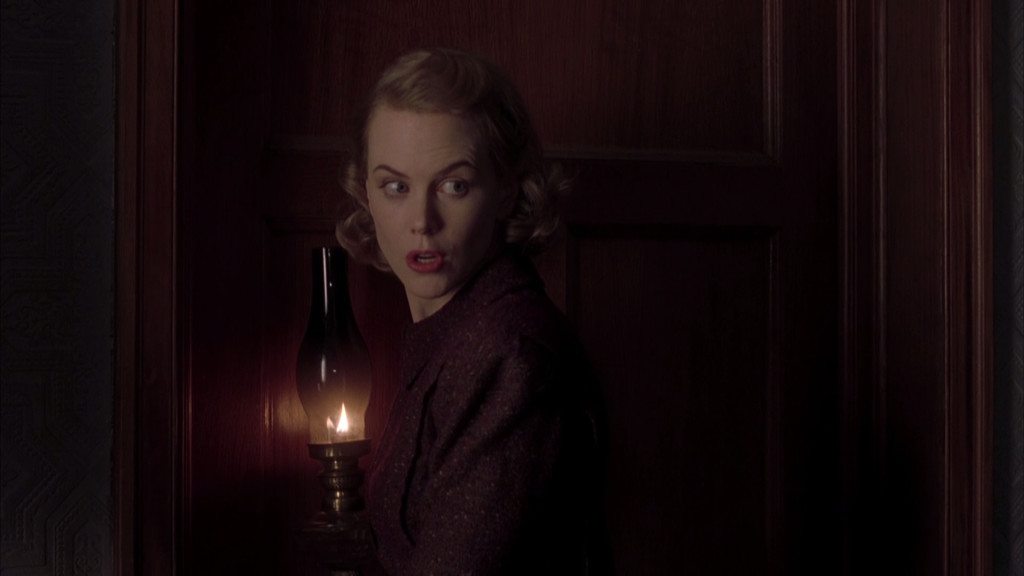Some films give you a sense of completion when they are done, and then there are films that have so much to offer that they push you into the process of multiple viewings. ‘The Others’ is one of them. On first viewing, it gives you a relatively straightforward story. It throws breadcrumbs throughout its runtime to keep you in touch with all the mysteries. But just when you think you have cracked it, it throws at you the ending that changes everything you think you knew about it. You are going to have to watch it at least one more time to catch all its nuances. Here, we break down all its twists and turns. If you haven’t seen the film yet, come back to this article later. SPOILERS AHEAD.
Plot Summary
Set in the late 40s, ‘The Others’ follows the story of a woman named Grace, who lives in a secluded house with her children, Anne and Nicholas. The kids suffer from a rare illness that makes them extremely sensitive to light, so much so that any contact with sunlight will kill them. When all the servants in her house suddenly leave without any word, she is forced to hire the new ones, who mysteriously appear at her doorstep. Their arrival in the house brings a lot of unexplainable problems with it.
The Ending

The film takes a shocking turn when it is revealed that the intruders are actually the new owners of the place. They came to live there after Grace and her children died. This means that the tables are turned. Grace thought the intruders were the ghosts that she needed to protect herself and her children from; instead, it was the other way around. This completely flips our view of the film and adds another layer to the story.
The reason that the intruders took down all the curtains was not that they wanted to kill Grace’s children. It was because they must have been fed up with the incessant opening and closing of curtains by the ghosts inside the house. This event is foreshadowed in the scene where Anne fights with Victor about closing the curtains, which frightens Nicholas.
This new understanding also makes the scene in the attic scarier. This was when Grace first realized that Anne had not been lying about the intruders. She follows them to a room at the top of the stairs. This is where she hears a woman and a child (who are Victor and his mother) and becomes so scared that she starts pulling off sheets from everything. Now, see this scene from the point of view of Victor and his mother, who must have been scared to death as all the sheets went haywire by themselves, which made them run away. After this, Grace begins the intensive search for the intruders, which ends with the scene in the piano room. Imagine all her actions as something that Victor’s family experiences on the other side, and the scene not only makes much more sense but also becomes scarier.
Another scene that can be explained in this manner is when Grace leaves Anne alone in the room, wearing her first communion dress. When she comes back inside, she finds an old woman in the dress instead of Anne. From a different lens, it would mean that Anne had possessed the old woman, which is why she was talking in her voice. Victor’s family would have seen her like that. But Grace didn’t know what was happening, so she attacked the old woman. This is what led the family to believe that the ghosts in their house were malevolent and wanted them out of the house. A simple change in perspective changes the entire meaning of the film, and that’s what makes it so good.
The film also indulges in symbolism that hints at the family’s ignorance about their situation. The simple fact that they choose to remain in the dark all this time is the metaphor of them not accepting their reality. The allergy of children to sunlight is the metaphor for their sensitivity to the truth- it will hurt them if they come in contact with it. The perpetual fog outside the house also shows us that the family has a very fogged view of their situation. The fog obscures the truth that is right in front of them and makes a lot of things unclear because of it. In the end, when Grace and the children realise the truth of the matter, the fog subsides and there is suddenly a sunny day. When they let the truth in, they let the light in.
Why Did Charles Leave?
One of the confusing things about ‘The Others’ has been Charles, Grace’s husband, and Anne and Nicholas’s father. Grace tells Mrs. Mills that he had left for war to fight the Germans. The war ended, but there was no word from him. Considering that significant time has passed since the end of the war, Charles’ absence clearly means that he was killed in action. However, this changes when Grace finds him in the woods. It turns out that he had simply gotten lost. Now that he is back to his family, everything should turn out for the better. But that doesn’t happen. Charles suffers from PTSD, and soon enough, he is ready to leave for the front again. Despite Grace’s pleas and his own guilt about leaving his family in the first place, he leaves.
The suspicions about his situation arise when he says he has to go back to the front. If the war is long over, why does he need to go back there? The answer to this riddle is found at the end of the film when it is revealed that every character has, in fact, been dead. In that case, why should Charles be an exception?
Here’s what’s really going on with him. Charles died in the war, which is why he never came back. Because he had died at the front, it became his haunting ground. Just like Grace couldn’t go beyond a certain distance from her house, Charles couldn’t leave the place where he met his death. When he tells Grace, “sometimes I bleed”, he is telling her that he died of a gunshot wound or some other injury that made him bleed to death.
Because he never got to see his family again, it was the one thing he wanted to check off his list in the afterlife. But again, he was confined to the place where he had died. Still, he was adamant about saying goodbye one last time, so he fought through the fog, just like Grace had, even if for a few moments. The fog gets thicker as the distance increases, which is why Charles gets lost. When he tells Grace that he has been looking for his home, he’s not lying.
He stays lost for a long time until Grace finds him. Had she not been dead herself, she wouldn’t even have seen him, and he would have stayed lost. However, because she is dead too, and she knows the way to the house, she can lead him out of the fog now. It doesn’t take much time for him to realize this. The family that he had been wanting to see all this time is also dead, and that’s what throws him into the pit of depression.
He tries to make peace with this fact, and when Anne tells him about “the last time mother went mad,” he comes to know exactly what happened that day. He confronts Grace about it, but she has forgotten all of that. What’s done is done; he can’t do anything for them now. Moreover, he must also feel tugged at from the place where he really belongs, which is why, despite his wish to be with them, he can’t stay.
How Did Grace and the Children Die?
Throughout the film, we find the children talking about “the last time.” Something happened the last time that made the servants go away without a word. This ‘something’ was a result of Grace “going mad.” It is also mentioned that she hurt the children, and it must have been pretty bad to make Anne shout, “she will not stop until she’s killed us.” In the end, it comes to light that Grace really did kill her children. Why? What made her go mad?
On several occasions, Grace talks about her aloneness to Mrs. Mills. She feels cut off from the world, and it isn’t hard to understand why. She lives in a secluded place with children who can’t go out in the sunlight. This means that, without them, she can’t go out; hence, no social life. There is no sign of her husband, and the only people she can talk to are servants, who aren’t exactly her friends. We also find her frustrated by her children sometimes, especially Anne, who is growing more rebellious by the day.
All of this can be too much for someone to handle, and this is exactly what happened with Grace. She did go mad, in the seclusion, gripped by loneliness. In one of her fits, she would have thought about getting rid of the problem, which would be her children. She must have thought that without them, she would be freer; she would be able to go away and find a new life for herself somewhere else. With no one to stop her or advise her otherwise, she smothered her children to death with the pillow. This is the incident that Anne keeps referring to throughout the film.
Once Grace came out of her bout and realized what she had done, she couldn’t forgive herself. No matter how much chained she felt by them, she still loved her children. The grief was too much for her to bear. So, she shot herself in the head.
The manner of deaths of the children and Grace is hinted at in several scenes of the film. Whenever things get tense, they react to the situation in accordance to the way they died. Anne and Nicholas start breathing erratically (indicating that they were suffocated to death), leading their mother to tell them to “stop breathing” like that. Grace, on the other hand, gets migraines, a side-effect of biting a bullet to the head. As for how long had they been dead, it must have been around a week or two. Grace tells Mrs. Mills that the postman didn’t pick up the post that week, which would mean that she and her children were dead before that.
Read More: Is The Others Inspired From a True Story?


You must be logged in to post a comment.